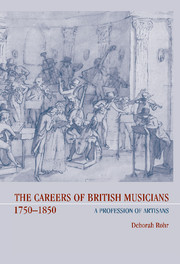Book contents
- Frontmatter
- Contents
- List of tables
- Acknowledgments
- List of abbreviations
- Introduction
- 1 The social and professional status of musicians in the eighteenth century
- 2 Social profile
- 3 Patronage
- 4 Musical education
- 5 Church musicians
- 6 Secular musicians: singers
- 7 Secular musicians: instrumentalists
- 8 Teachers, composers, and entrepreneurs
- 9 The fortunes of musicians
- 10 The struggle for social and professional status
- Epilogue
- Appendix
- Notes
- Bibliography
- Index
8 - Teachers, composers, and entrepreneurs
Published online by Cambridge University Press: 20 October 2009
- Frontmatter
- Contents
- List of tables
- Acknowledgments
- List of abbreviations
- Introduction
- 1 The social and professional status of musicians in the eighteenth century
- 2 Social profile
- 3 Patronage
- 4 Musical education
- 5 Church musicians
- 6 Secular musicians: singers
- 7 Secular musicians: instrumentalists
- 8 Teachers, composers, and entrepreneurs
- 9 The fortunes of musicians
- 10 The struggle for social and professional status
- Epilogue
- Appendix
- Notes
- Bibliography
- Index
Summary
Most musicians depended on several types of employment. Teaching, with which many musicians supplemented performance income, was in some cases lucrative enough to become the musician's sole or primary occupation. Composing, on the other hand, was less reliable. Some musicians may have wished to build careers primarily as composers, but they most generally had to combine composition with other forms of musical employment. Other musicians expanded their activities beyond performing, teaching, or composing, to include entrepreneurial ventures as publishers and sellers of printed music, and even the musical instrument trade.
Teachers
Most professional musicians worked as teachers at some point in their careers. The 1841 census lists three thousand music teachers, reaching five thousand by 1851; the number would be even greater if it included the part-time teaching of most of the individuals classified in the census as “musicians.” One writer pointed out that “not only [do] all those engaged in our orchestras employ themselves in teaching … but our leaders and solo performers find it expedient to betake themselves to the same occupation.” The musicians who worked exclusively as teachers, and not to supplement other work, were either relatively unqualified or unfortunate musicians who had to rely entirely on the uncertain income from a few students, or the most successful teachers who amassed such lucrative practices that they could devote their energies entirely to teaching.
- Type
- Chapter
- Information
- The Careers of British Musicians, 1750–1850A Profession of Artisans, pp. 134 - 153Publisher: Cambridge University PressPrint publication year: 2001



